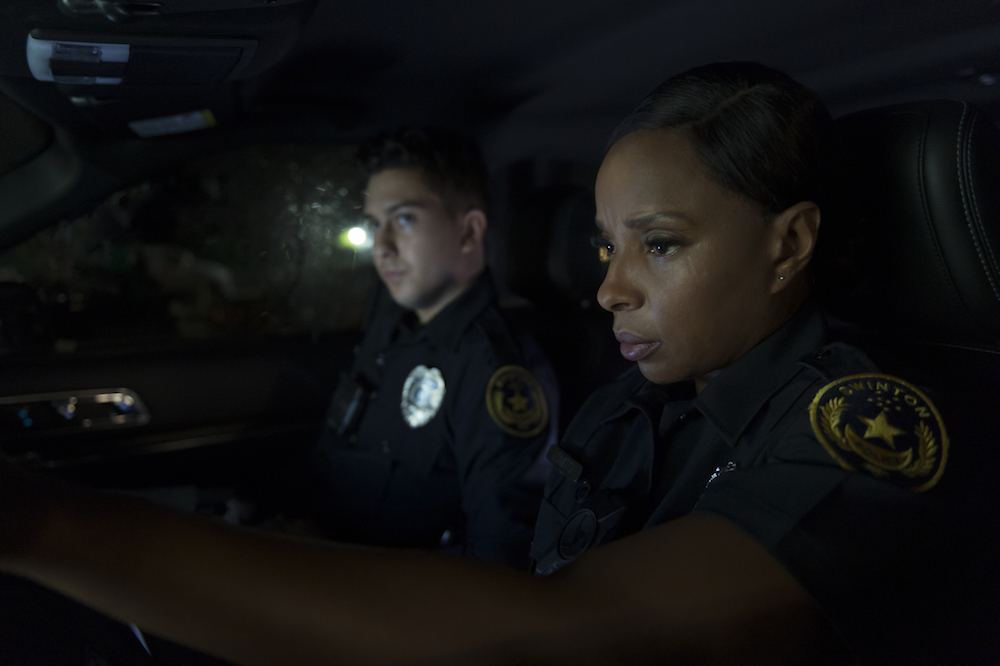‘Body Cam’: Film Review
By Lisa Kennedy
LOS ANGELES (Variety.com) – One of the appalling — and appealing — traits of malevolent presences onscreen is that they can be so darn imprecise in their revenge. Often victims of unfairness, ghosts and assorted other supernatural baddies may exact a semi-rational but flawed retribution. (Got bullied? Easy: Kill all the randy teens.) So it’s right to wonder what’s up with the cop killer in “Body Cam,” starring Mary J. Blige, with fine backup from Nat Wolff.
After all, the targets of the ravenous violence appear to be cops of color — not that the police department takes note of the pattern. (Cops seeing only blue, perhaps?) But for viewers, it should be striking. What can that fact possibly portend? What’s the contemporary moral here? These questions dog “Body Cam,” making it intriguing, though not exactly visionary; it’s more twisted puzzle than horror ride. Not that there aren’t jumpy moments, and tense interludes.
In his sophomore feature, director Malick Vitthal handles his able cast and current-affairs-minded story (by Richmond Riedel and Nicholas McCarthy) with taut finesse. (His debut drama “Imperial Dreams” won a Sundance Audience Award in 2015.) After an extremely limited release on a few drive-in screens in March, “Body Cam” releases as one of those relatively expensive digital rentals — à la “Trolls World Tour” and “The High Note” — on May 19.
The movie opens with TV news reports of the acquittal of a police officer for the killing of an unarmed black man. It doesn’t matter that the patrons of a Swinton, La., diner are watching news from Los Angeles, when a police officer comes in from a pouring rain for a coffee. This community, too, is sick and tired of being sick and tired. The diner’s proprietor tells the cop just that in so many words.
A short time later, a traffic stop turns deadly for the officer. “Don’t make me hurt you, please,” are some of his final words before his body cam goes haywire.
Officer Renee Lomito-Smith (Blige) and new partner Danny Holledge (Wolff) get the call. She’s just returned to duty after a family tragedy and suspension. A civilian questioned her legitimacy — not as a cop but as an African American. The encounter did not go well. Now she’s looking at dash cam footage that jars and confuses. Not least because after Renee views it, the detective on the scene says that both patrol car and body cam footage are too damaged to watch. What gives?
A welcome addition to any ensemble, David Zayas portrays Renee’s sympathetic watch commander. He’s the one who pairs her with baby-faced rookie Danny. Wolff delivers a personable version of the wet-behind-the-ears newbie, beginning with his slangy “What up?” greeting to Renee and the other officers gathered before the start of the night shift. The nighttime work makes the movie’s scares easier to come by; Renee and Danny are constantly entering dark spaces with flashlights drawn, hands on gun butts.
The suspect is believed to be a hooded woman driving a Chevy van of an especially unattractive vintage. At least the suspect looks like a woman. The carnage wrought suggests otherwise.
A convenience store called Lucky’s turns out to be anything but when the suspect wanders in. She’s followed by a couple of guys who are jerks — or worse — and soon after that by two police officers who spotted the van. In an impressive bit of unnerving direction on the part of Vitthal and cinematographer Pedro Luque, an already dodgy situation escalates, leaving a charnel house mess. And a cellphone Renee palms that may provide answers.
Renee follows a hunch that leads to a house haunted by loss and abandoned by its occupant, a woman whose teen son was killed in a random act of gun violence. Anika Noni Rose plays mom Taneesha Branz.
“You gotta trust me, okay?” Renee tells Danny, as she bends rule after rule: snagging evidence, entering a suspect’s house without a warrant, going mildly rogue. Headed into that house, she tells Danny to keep his body cam off. “This is my business.” This exchange and a few others suggest another spirit haunting “Body Cam”: “Training Day.”
Trust, it turns out, is what Blige invites. Renee’s cohort-in-blue may worry about her stability, but the film doesn’t. Blige’s unforced performance as a grieving mom, thoughtful wife and a dedicated police officer anchors questions of good cops (those seemingly on screen) and bad cops (those seemingly populating the national news hours) that hover over “Body Cam.”
While director Vitthal and Blige keep audiences engaged, there are threads here that get tugged on and then dropped: A white, female detective (Lara Grice) shows up a couple of times, mostly to chastise Renee about procedure and the chain of evidence; Demetrius Grosse’s role as Renee’s husband is sympathetic enough to make his absence in the back side of the story felt; that Swinton’s denizens are accent-free feels a little unlikely. This is Louisiana, for heaven’s sake. (The movie was shot there.) It don’t take a lot of “y’alls,” but the only gumbo filé thrown in comes in a visit to the morgue where the affably reluctant coroner (Jeff Pope ) is listening to trumpet-riffing jazz as he goes about his grim work.
With the ongoing coverage of the killing of Kentucky EMT Breonna Taylor by Louisville police, this week may seem an awkward one to open a movie in which the victims of violence are police officers. But, like other recent horror films that leverage race, “Body Cam” intends to offer lessons about where we are as a society.
The upside of that effort? “Body Cam” has a star and director who bring nuance to the work, injecting understated gravity into an entertaining, unsettling movie. The downside: the sense that it’ll take supernatural intervention to make things right between black citizens and their police.

